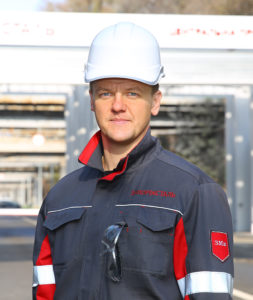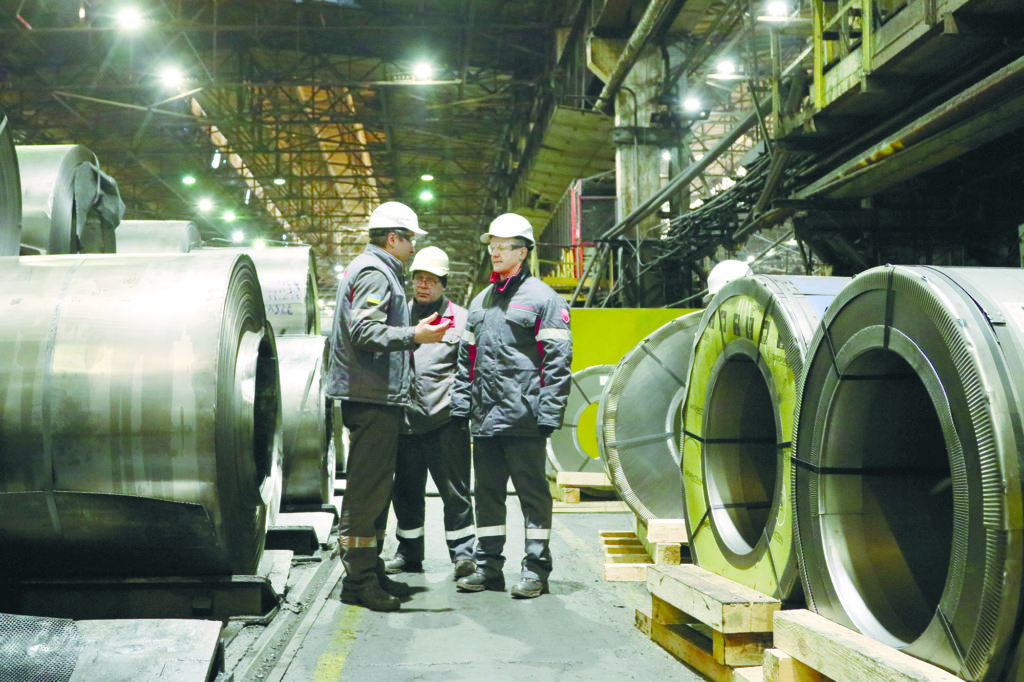 The beginning of the New Year is always associated with changes – something has been achieved and a final line has been summed up under this stage, something has been planned and the path to this goal has only just begun. Zaporizhstal Works turned the page-2019 and writes a new life chapter in its development history. Our interview with the General Director of the Works, Alexander Mironenko, about the tasks of today and tomorrow turned out to be frank, important and interesting.
The beginning of the New Year is always associated with changes – something has been achieved and a final line has been summed up under this stage, something has been planned and the path to this goal has only just begun. Zaporizhstal Works turned the page-2019 and writes a new life chapter in its development history. Our interview with the General Director of the Works, Alexander Mironenko, about the tasks of today and tomorrow turned out to be frank, important and interesting.
— Aleksandr Grigoryevich, this is your first interview for Dneprovsky Metallurg. Therefore, the first question will be personal. Tell readers about yourself, about your path to metallurgy.
— I was born in Kyiv, graduated from a regular high school. We lived in the working district of Kiev, where a number of enterprises are located, and my parents worked there. In fact, I grew up in a family of engineers. Therefore, my life choice was quite logical: I entered the Kyiv Polytechnic Institute at the Faculty of Mechanical Engineering, specializing in “Processing of materials by special technologies”. By the way, at the institute in the 2nd year, I met my future wife Tatyana, with whom I am happy until today, and we are raising two children – a son and a daughter (smiles – an editorial note). After graduation, I joined the Smart Group company, worked at the Makeevsky Metallurgical Plant, then at the Promet Steel plant. In 2007, I moved to Metinvest. I was engaged in the loading of production capacities of the Group’s enterprises, their planning, marketing. Since 2016, I worked in the Operational Directorate of Metinvest, where I was directly involved in improving processes and reducing losses, improving the efficiency of the metallurgical enterprises of the company. I headed the production directorate of the Metinvest’s Operations Directorate prior my appointment in November 2019 to Zaporizhstal.
I know metallurgy well from the inside, its problems and challenges. And I gained this experience without sitting at the computer, but directly in the workshops of Metinvest enterprises. Sometimes for weeks I was at the production site. Instead, I gained the necessary practical knowledge.
— Your appointment as Director General – tell us about it. Was there any doubt? After all, a huge factory – but the same responsibility.
— Yes, there was excitement. Yes, it was a challenge. Prior to this, I actually dealt only with the manufacturing sector. Now it is completely the economic and social activities of such a huge enterprise as Zaporizhstal. Moreover, Zaporizhstal has always been a leader in Ukrainian metallurgy, and the main thing is not to lose that leadership positions. But I always take challenges calmly, when making decisions I am guided by the principle “You never know what you can do utill you try”. Therefore, I accepted the proposal of the company’s leaders to move to this position.
As for the family, I was fully supported. The only negative is that the eldest son is almost a graduate, so for now I can’t bring the whole family to Zaporizhzhia. But our plans include moving in the future.
— You came to the Works, knowing that metallurgy is in crisis, that difficult decisions are ahead. As they say, immediately into battle. And today we see that the Works is operating, it is maintaining stable production. How does this work out?
— In fact, this is the merit of the whole team. There is and has always been a strong team at Zaporizhstal. And together we confront the crisis. Somewhere shook, tightened their belts. Most importantly, we understand that, having gathered in one strong fist, we will overcome this crisis.
Yes, if we talk about the period in the Works’ life, when I headed it, it is certainly not easy. The crisis has already begun to put pressure on the industry, not only in Ukraine, but also in world metallurgy. The recession began in late spring 2019 and continued uninterrupted. Before the crisis, there were no restrictions on financing investment and social programs, the salary of employees grew, but in November, when I headed Zaporizhstal, metallurgy entered the toughest global crisis in the last 10 years and it became clear that all programs needed to be cut, for overcoming a difficult period with minimal losses. Perhaps, from a personal point of view, it would be more profitable to wait with a decision to lead the Works in a crisis, but why? You need to go and do it in difficult times, be a part of the team, solve problems together.
— In your opinion, when do you come to know people better: in crisis conditions or, conversely, when there are no problems?
— Joining a team, of course, is good when everything goes well. You don’t need to take difficult decisions. But I’ll tell you such a thing: people are revealed precisely in a difficult situation. And the more we enter this crisis, the more people rally together and realize that we must move forward with clenched teeth. This unity and mobilization of forces is a plus for the entire Zaporizhstal collective.
— The first 100 days in your position have not yet passed, however, let’s summarize the first results. What has been done, achieved? Indeed, with a fresh look you probably saw some bottlenecks.
— Yes, I did. I will dwell on one example. Back in the fall, we had a problem with the deadlines for the execution of orders, and this entailed a lot – high-quality customer service, timely delivery of products to the customer, and the loading of the enterprise, its competitiveness, finally. But, starting in October, due to clear planning of production and the involvement of all Works’ services, we can say that the situation was stabilized. Now we have 99% of the orders completion. This is a good result, and thanks to this we have more stable financing. And here the merit of the whole team, starting from the General Director and ending with the foreman at the production site. Responsibility, involvement of everyone at their workplace – this is the very reserve that has been successfully used.
— Do you have problems with production distribution and capacity utilization?
— In the first quarter, even in the first four months of the year – no. Now we can see a stable load, but as it will be further – it is hard to predict yet, the market situation remains very difficult. Our task is to work better than laid down in the business plan.
— What areas do you need to work on in the new year?
— The main task facing us is to fulfill the planned production volume, it is the same level that was in 2019. The second main requirement is to reduce the amount of non-conforming products. For each ton of non-conforming products, we lose $ 100-150, compared to the suitable one. This money is the reserve that we can use to finance investment and social projects. This is salaries of our people. How to increase salaries? Only due to this. Therefore, the main direction of the year is a stable production and quality improvement.
— What investment projects are priority in the near future?
— As I already said, many investment projects are in a frozen state until the situation on the global steel markets improves. This does not mean that we are abandoning them in the future. As soon as metallurgy goes through this crisis cycle, and the industry become cyclical, we will return to our large-scale investment programs. However, even in 2020, despite the crisis in the industry, we will not stop investing in environmental projects, in working conditions, I also hope we will continue the remotorization of locomotives (the remotorization program has been operating for two years, during this time Zaporizhstal remotorized six diesel locomotives and invested UAH 57 million – editorial comment). An absolute priority is the implementation of environmental program measures, even if these projects are not as large as the construction of the new pickling line or new blast furnace, but they will help us reduce the environmental impact of Zaporizhzhia.
— What about BOF construction project?
— Large-scale reconstruction of the steel processing was and remains a key task for the enterprise. You well know that in order to implement a project and build converter shop, the Works needs huge investments – more than $ 1 billion over 5-7 year. There are no such free funds, the company is working on finding a source of financing and project partner. As soon as the issue of financing is resolved, we are ready to proceed with the implementation of this project, which is extremely important for the environment.

— Aleksandr Grigoryevich, it turns out that in our conversation we discuss two topics such as the crisis in industry and people who oppose it. In view of this, there is a question. Can you say that there is a clear path for the youth at the Works?
— For sure. Both in the company and at the Works there are good prospects for professional growth and building a successful career for young people. For our young people there are only two conditions. The first one – keep putting one foot in front of the other, the second one – there should be a desire. If there are not enough skills, we are ready to give these skills, to teach, to show, to tell.
I visit workshops a lot and see many young people, with bright eyes and necessary experience. Moreover, as the CEO, I set myself the goal to identifying these people, creating a solid skeleton of youth, so that they feel the future and see their career at the Works and in the company.
Of course while improving, they will make mistakes in something, and we are ready to forgive these them these mistakes to a certain extent. Only so that our youth, through their initiative, desire to make changes and improve the system, will give us the result. Combining youthful enthusiasm with the experience and mentoring of more mature people working at the Works. We will use this synergy to grow a new generation of metallurgists. Technology does not stand still and we need people who can replace us in the future. And now we will be quite attentively engaged in this area together with the leaders of the Works, HR department, and the youth organization.
— How can each of employees help the Works in this difficult period?
— They can help with a responsible and caring attitude to their work responsibilities. Indifference, inertia, negligence lead to direct production losses, defective products. Now 60-70% of losses are not just equipment failures, but a human factor: fail to do, did not think, did not control. From these “little things” an integral picture is formed. And if we exclude them, we will avoid production losses. Responsible business – through PSS, engagement, personal initiatives – this is what will help us.
— Metallurgical production is a team work, these are people, first of all. What would you wish our metallurgists in the new 2020 year?
— Confidence in the future. So that we all clearly know while coming to work every day that we have a load, we have plans for the future, and good perspective. I am sure that we have all this. The crisis is cyclical, and we have already experienced it.
— Thank you for such a sincere interview.
